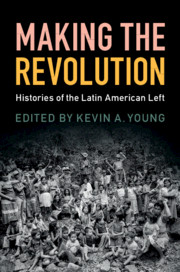Book contents
- Making the Revolution
- Making the Revolution
- Copyright page
- Dedication
- Contents
- Figures
- Contributors
- Editor’s Note
- Abbreviations
- Introduction Revolutionary Actors, Encounters, and Transformations
- 1 Common Ground
- 2 Identity, Class, and Nation
- 3 Indigenous Movements in the Eye of the Hurricane
- 4 Friends and Comrades
- 5 Total Subversion
- 6 “Sisters in Exploitation”
- 7 Revolutionaries without Revolution
- 8 Nationalism and Marxism in Rural Cold War Mexico
- 9 The Ethnic Question in Guatemala’s Armed Conflict
- 10 For Our Total Emancipation
- Index
7 - Revolutionaries without Revolution
Regional Experiences in the Forging of a Radical Political Culture in the Southern Cone of South America (1966–1976)
Published online by Cambridge University Press: 08 July 2019
- Making the Revolution
- Making the Revolution
- Copyright page
- Dedication
- Contents
- Figures
- Contributors
- Editor’s Note
- Abbreviations
- Introduction Revolutionary Actors, Encounters, and Transformations
- 1 Common Ground
- 2 Identity, Class, and Nation
- 3 Indigenous Movements in the Eye of the Hurricane
- 4 Friends and Comrades
- 5 Total Subversion
- 6 “Sisters in Exploitation”
- 7 Revolutionaries without Revolution
- 8 Nationalism and Marxism in Rural Cold War Mexico
- 9 The Ethnic Question in Guatemala’s Armed Conflict
- 10 For Our Total Emancipation
- Index
Summary
This chapter will examine the transnational militant political culture that emerged from the constriction of political space, socioeconomic crisis, and increased social polarization during the late sixties and early seventies. The elements of this political culture can be briefly described as follows: a Latin Americanist view supported by regional exile experiences; a set of ideas initially critical of the traditional left; and, lastly, a model activist associated with the idealized figures of the revolutionary soldier and the proletarian. This political culture was not merely the result of a number of preformed ideas. Rather it resulted from the interaction of previously held ideas and the political process that these activists had to face. It was in that process that these activists gradually developed a unique political culture, which was built in the course of the regional exchanges that were born of the uncertain historical contingency of local processes that often led them to places that were inconceivable in the mid-1960s.
- Type
- Chapter
- Information
- Making the RevolutionHistories of the Latin American Left, pp. 185 - 211Publisher: Cambridge University PressPrint publication year: 2019

